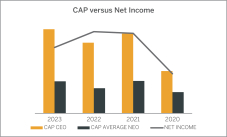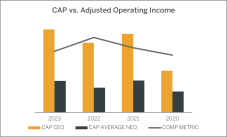
7701 East Kellogg Drive, Suite 850
Wichita, Kansas 67207
March 14, 2024
NOTICE OF 2024 ANNUAL MEETING OF STOCKHOLDERS
To the Stockholders of Equity Bancshares, Inc.:
Notice is hereby given that the 2024 Annual Meeting of Stockholders (the “Annual Meeting”) of Equity Bancshares, Inc. (the “Company”) will be held on April 23, 2024 at 4:00 p.m., Central Time, at Wichita Country Club, 8501 E. 13th Street North, Wichita, Kansas 67206. The Annual Meeting is being held for the following purposes:
| 1. | to elect four Class II members to the Company’s Board of Directors to serve until the Company’s 2027 Annual Meeting of Stockholders each until their successor is duly elected and qualified or until their earlier death, resignation or removal; |
| 2. | to vote on a non-binding, advisory resolution to approve the compensation paid to our named executive officers for the fiscal year ended December 31, 2023, as described within this Proxy Statement (commonly referred to as a “say on pay” vote); |
| 3. | to approve the First Amendment to the Equity Bancshares, Inc. 2022 Omnibus Equity Incentive Plan to increase the number of shares available for issuance under such plan; |
| 4. | to ratify the appointment of Crowe LLP as the Company’s independent registered public accounting firm for the year ending December 31, 2024; and |
| 5. | to transact such other business as may properly come before the meeting and any adjournment(s) or postponement(s) thereof. |
These proposals are described in the accompanying proxy statement. The Board of Directors has fixed the close of business on March 1, 2024, as the record date (the “Record Date”) for the determination of stockholders entitled to notice of and to vote at the Annual Meeting or any adjournment(s) or postponement(s) thereof. Only stockholders of record at the close of business on the Record Date are entitled to notice of and to vote at the Annual Meeting. The stock transfer books will not be closed. A list of stockholders entitled to vote at the Annual Meeting will be available for examination at the Company’s principal executive offices for ten days prior to the Annual Meeting and during the Annual Meeting.
You are cordially invited to attend the Annual Meeting; however, whether or not you expect to attend in person, you are urged to submit your proxy so that your shares of stock may be represented and voted in accordance with your preferences and in order to help establish the presence of a quorum at the Annual Meeting.
We have adopted rules promulgated by the Securities and Exchange Commission that allow companies to furnish proxy materials to their stockholders over the Internet. On or about March 14, 2024, we mailed a Notice of Internet Availability of Proxy Materials to all stockholders of record at the close of business on the Record Date, containing instructions on how to access our proxy materials and how to vote your shares, as well as instructions on how to request a paper copy of our proxy materials.
Important Notice Regarding the Availability of Proxy Materials for the 2024 Annual Meeting of Stockholders to be Held on April 23, 2024. Our proxy materials, including our proxy statement and Annual Report on Form 10-K for the year ended December 31, 2023, are available at investor.equitybank.com.
By Order of the Board of Directors,

Brad S. Elliott
Chairman and Chief Executive Officer
YOUR VOTE IS IMPORTANT
Whether or not you plan to attend the Annual Meeting, please read this proxy statement and the voting instructions in the Notice of Internet Availability of Proxy Materials. Then please vote over the Internet or, if you received or requested a paper proxy card in the mail, by completing, signing, dating and mailing the completed proxy card to us. The instructions in the Notice of Internet Availability of Proxy Materials or your proxy card describe how to use these convenient services.
























